Warner Bros. has persisted in their quest to try and build blockbuster brands from public domain properties, seemingly chasing their big surprise success with Guy Ritchie’s duo of Sherlock Holmes movies from the turn of the decade. Sometimes, this results in a decent, but forgettable blockbuster romp, such as The Legend of Tarzan. Sometimes however, it can result in a significant and expensive misfire like Pan. In an effort to minimize risk then, Warner Bros. hired Guy Ritchie himself to try and better the odds of their latest public domain blockbuster experiment, and the result is King Arthur: Legend of the Sword… The biggest box office bomb of 2017 so far.
With its projected losses sitting at a catastrophic $150 million or more for Warner Bros. at this point, one has to wonder if King Arthur: Legend of the Sword is some sort of divine punishment for the studio. Warner Bros. has at least derived significant profits from their previous blockbuster efforts of this year, The LEGO Batman Movie and Kong: Skull Island specifically, and will no doubt continue to do so with the imminent release of DC Extended Universe flick, Wonder Woman into theatres, but King Arthur: Legend of the Sword nonetheless seems to stand as the biggest proof yet that the studio needs to stop looking to the public domain to forge profitable and successful blockbusters. It’s clearly no longer working out for them, especially when blockbuster-heavy competition from studios like Disney, 20th Century Fox and Universal most notably has consistently been more noteworthy and more reliably strong.
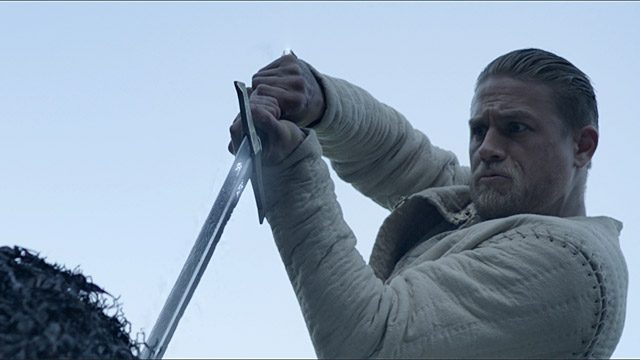
As for this movie’s final product though, it’s no wonder that it bombed at the box office, since it feels like a rather mis-conceived effort to freshen up the fable of King Arthur for modern audiences. That’s not to say that King Arthur: Legend of the Sword isn’t entertaining, since it does have its moments of fun, humour and action-packed style, but it’s very scattershot overall. For every cool moment, there’s a cringe-worthy one. For every funny moment, there’s a failed joke that lands with a thud. For every awesome visual sequence, there’s an unintentionally funny botched CG effect that makes King Arthur: Legend of the Sword start resembling an overlong PlayStation 4 cutscene. The presentation is nonetheless the best thing about this movie, but it’s not long before King Arthur: Legend of the Sword unfortunately devolves into a hodgepodge of smack-talking, hyper-masculine noise, leaving its audience too limited and its direction too confused to really make for a widely appealing blockbuster.
King Arthur: Legend of the Sword aims to showcase a pre-Knights of the Round Table variation of King Arthur, and since this is a Guy Ritchie movie, you can imagine what King Arthur’s origins are like in this take. Orphaned at a young age and raised in a brothel, Arthur has become a young man with outrageous street smarts and no shortage of street fighting abilities. The movie’s journey thus has Arthur learning how to harness that vagabond side to become the hero that England needs, after an obligatory sword-pulling test (yes, that one), has him labeled an enemy of the state, and targeted for death by the evil usurper king, and Arthur’s own uncle, Vortigern.
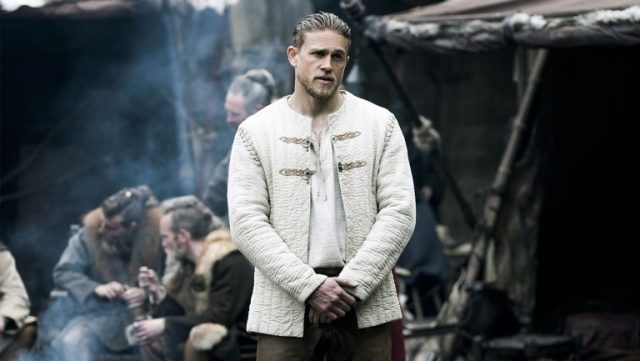
King Arthur: Legend of the Sword assembles a mostly decent cast, with Charlie Hunnam channeling his Sons of Anarchy days as the rough and raw young take on Arthur. Hunnam’s Arthur succeeds pretty well at feeling like a lovable badass too, and seems to fit right in with Ritchie’s more cool and aggressive take on Arthur, especially with how beefy and muscular Hunnam got to play this part. Hunnam is also complemented by an equally grimacing supporting cast in Aidan Gillen’s nigh superhuman archer, Goosefat Bill, Djimon Hounsou’s resistance leader, Sir Bedivere, and Astrid Berges-Frisbey’s unnamed ‘mage’, who essentially acts as our Merlin stand-in, though beyond their intense expressions, they have almost no character development whatsoever. Berges-Frisbey is the worst off, having to be the ambassador for a magical faction that feels like most of its development was left on the cutting room floor. Oh yes, there’s a lot of poking at the lore of a faction of magic users called mages in King Arthur: Legend of the Sword, who seem to control animals, likely as obvious sequel bait. It’s not really much of a thing in this movie proper though, so Berges-Frisbey mostly just stands there to look disapproving, and serve as a Deus Ex Machina for the heroes at all other times.
Perhaps the most noteworthy elements of a cast that often quickly drowns in all of the overdone headbanging Guy Ritchie presentation are Eric Bana and Jude Law, playing Arthur’s father, Uther Pendragon and Arthur’s uncle, usurper king, Vortigern, respectively. Law’s Vortigern is easily the most memorable character in King Arthur: Legend of the Sword, reuniting with Ritchie after previously working with him on Ritchie’s duo of Sherlock Holmes movies, and that’s likely because he’s not bothering to take his one-dimensional villain in any way seriously. Law is so hammy that he’s brilliant, especially in a thoroughly insane climax that needs to be seen to be believed, and not necessarily for the right reasons! As for Bana, well, he’s not in the movie very much, and is given all of the scenes that carry any kind of effective dramatic weight. You know something in your movie went very wrong when the guy who is only there to die somehow comes out looking the most dignified among the cast!
King Arthur: Legend of the Sword is one of those special movies that feels like it has both too much plot, and barely any plot at all. The movie works overtime to try and build an intricate, politically intriguing world, with elements of heavy darkness and violent fantasy, and some of its ideas are legitimately cool in concept. Despite that though, you could sum up virtually the entire movie with the plot synopsis of Arthur being orphaned, pulling the legendary sword, Excalibur from its stone, then trying to remove his uncle from power as England’s king. For all of its pomp and circumstance, this by-the-book tale of knights and fantasy hits a lot of ultimately familiar beats, making much of its storytelling feel like much ado about nothing.
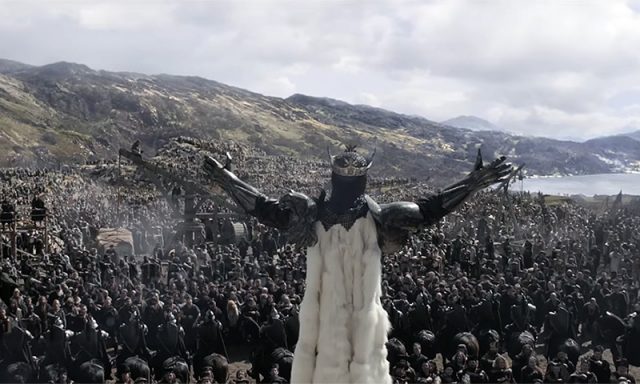
It also doesn’t help that King Arthur: Legend of the Sword constantly gets side-tracked with trying to build a larger world before it even knows if it’s going to get any sequels. There’s separate story arcs with Vikings, mages, gangs, and other such elements that feel like they’re trying to exist in a Game of Thrones-style universe that can be explored over the course of many movies. All they amount to doing in the end though is distracting from the main storyline, leading to an overload of unnecessary information that has King Arthur: Legend of the Sword’s plot quickly collapsing under its own weight, and ultimately becoming all too forgettable. This is the textbook example of a movie that clearly bites off a lot more than it can chew!
If nothing else, Guy Ritchie’s direction is certainly very distinct. His brash, but comical gangster-fueled style is applied all over King Arthur: Legend of the Sword, which is trying so hard to be cool and sophisticated that it almost descends into self-parody. Maybe that’s the point, and there are indeed a few moments where King Arthur: Legend of the Sword becomes so bad that it’s ironically enjoyable, but it still takes itself seriously enough to not be able to commit to that ironic badness. Instead, Ritchie feels too often torn between making a serious fantasy blockbuster and making another of his light-hearted gangster flicks, with King Arthur: Legend of the Sword feeling like it’s trying to mix King Arthur’s story with the blockbuster-style masculine pomp of Ritchie’s Sherlock Holmes movies, while basted in the secret sauce of arguably Ritchie’s most beloved crime comedy, Snatch. If that sounds to you like it’s not going to work, and will merely leave a big mess, then you’re correct.
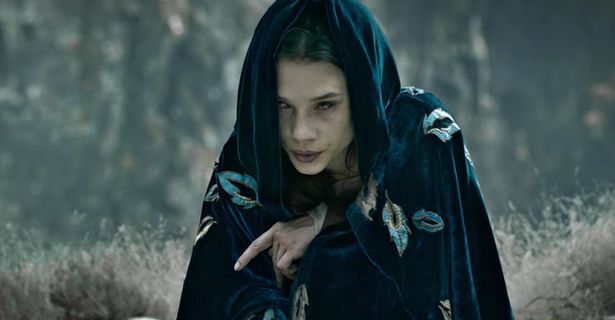
Ritchie’s direction just feels like it’s all over the place in King Arthur: Legend of the Sword when it comes down to it. There are some great moments of high fantasy warfare and legitimately action-packed street scraps, but there are also strange and just plain baffling directing flourishes here and there, such as distracting chase cams that film the actors in extreme close-up while their characters flee danger, or the aforementioned climax where Ritchie feels like he got confused and suddenly thought he was making a Dark Souls movie. It feels like Ritchie was just throwing anything at the wall and seeing what sticks with King Arthur: Legend of the Sword, which makes it feel so much messier and more unhinged than Ritchie’s more elegant and memorable Sherlock Holmes movies were. That’s a shame, since the scattershot directing quality leaves a lot of unrealized potential on the table.
King Arthur: Legend of the Sword’s soundtrack is composed by Daniel Pemberton, a brash and youthful composer that fits right in with Guy Ritchie’s style, particularly since he previously collaborated with Ritchie on his 2015 film adaptation of The Man From U.N.C.L.E. Pemberton’s score, which seems to combine heavy metal medieval flourishes with modern rock and synth, cranks the movie’s machismo up to almost hilarious levels, which might have worked, had King Arthur: Legend of the Sword fully committed to its liberal absurdity. It’s not a bad score by any means, and it does add a good chunk of Ritchie-approved charm to the experience, though some people are probably going to find the score too obnoxious as well, since it really does feel like it’s trying too hard in several spots.
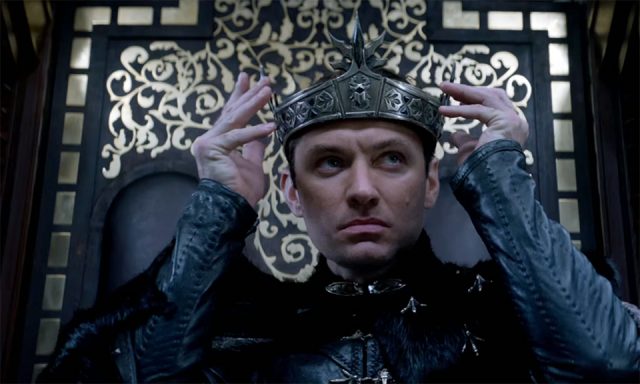
The rest of the audio is just as brash and aggressive as everything else, accentuating as much power and ferocity as possible through the swords and sorcery on display. King Arthur: Legend of the Sword almost feels like it’s actively assaulting the senses with its high-powered sound mixing, which can work well during the better-realized and disappointingly rare scenes of large-scale warfare, but otherwise feels like the movie is trying way too hard to impress the audience. After a while, it just becomes overbearing, and your brain will start tuning it out.
King Arthur: Legend of the Sword boasts a truly enormous $175 million budget, and as I said, the presentation and visuals are easily the best part of the experience. There’s quite a lot of style to this movie, if nothing else, and while it’s pretty much completely lacking in any degree of substance, the visuals are generally really good. There’s some fantastic moments of action, dark magic and widespread warfare in King Arthur: Legend of the Sword, along with a couple of creature effects that really do look incredible. This is let down somewhat by an overly CGI-heavy climax however, which feels like it breaks the immersion and will take audiences too far out of the experience. That said, all in all, this is a great-looking movie, and one that at least makes good use of its high budget. I doubt that’s much consolation to Warner Bros. after the box office numbers came in, but for what it’s worth, those that do see King Arthur: Legend of the Sword are at least in for a visual treat.
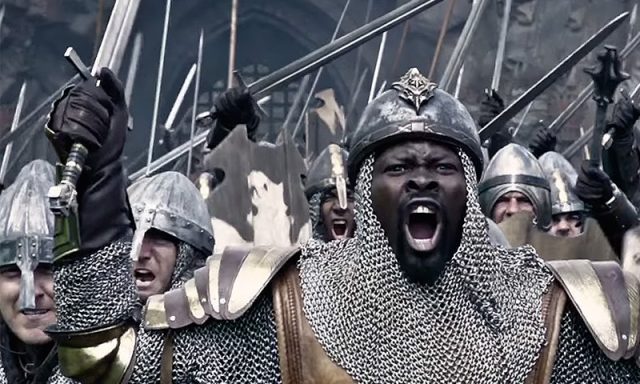
King Arthur: Legend of the Sword is also available in 3D, and for the most part, the 3D is quite good. Like everything else though, the 3D presentation in King Arthur: Legend of the Sword is very intense, so if you get headaches or motion sickness from watching 3D movies, then definitely stay far away from the 3D cut of this movie! If you happen to savour good 3D presentations though, then King Arthur: Legend of the Sword is best experienced in the 3D format, where its action scenes feel more powerful, and its environments feel more large-scale, immersive and dangerous. Unfortunately, the movie’s extensive delay ended up denying it an IMAX 3D cut in the end, which is a shame, due to how strong the 3D and atmosphere is, but even when just watched flat in 2D, King Arthur: Legend of the Sword is an exhilarating visual experience. It’s too bad that some of the CGI effects definitely turned out better than others, but fortunately, that’s a small minor blemish amidst an otherwise outstanding visual presentation.
King Arthur: Legend of the Sword feels like a noble experiment by a maverick director that just didn’t end up meshing as well as hoped. If nothing else, this movie is more interesting and more entertaining than Ritchie’s previous directing effort, The Man From U.N.C.L.E., but it also frequently fails as a fantasy blockbuster, due to being too messy, overdone and inconsistent. The movie is, if nothing else, visually stunning, and offers plenty of solid action if that’s what you’re into, but with Ritchie seemingly never being reigned in, and the movie clearly caring more about looking cool than leaving an impression, it’s sort of unsurprising that King Arthur: Legend of the Sword ended up becoming one of 2017’s most expensive box office bombs.
Ritchie apparently planned six movies in an ongoing King Arthur blockbuster saga for Warner Bros., but that’s obviously never going to happen now, since this would-be franchise’s expensive box office losses have left it dead in the water before it even properly got started. Unfortunately, this drags down the meandering and bloated storytelling of King Arthur: Legend of the Sword even more, since all of its world-building and foreshadowing is now going to amount to nothing. Instead, what we’re left with is a passably enjoyable, yet nonetheless disappointing chunk of lost potential, seemingly killed by its own delusions of grandeur.
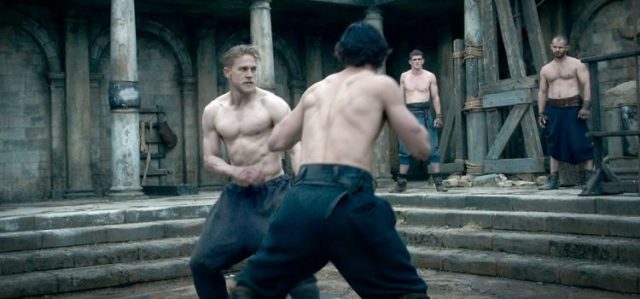
If you like fantasy, and have a particular soft spot for Guy Ritchie movies and/or Arthurian lore, then King Arthur: Legend of the Sword is at least worth a rental when it comes to home viewing, especially since it’s a better attempt at a King Arthur-inspired blockbuster than Touchstone’s and Buena Vista’s previous poe-faced and dull King Arthur movie from 2004. Unless you’re actively seeking a movie that’s about nothing but aggressive style though, it’s tough to recommend a trip to the theatre for this, especially when you can save your moviegoing money for more interesting and hopefully better blockbusters later this Summer. Heck, we’re even getting another King Arthur story of sorts in Transformers: The Last Knight a mere month from now! Maybe in that case, Warner Bros. can at least lick their wounds with the knowledge that they may have made this Summer’s best King Arthur adaptation, even if I doubt that will comfort their investors very much.

